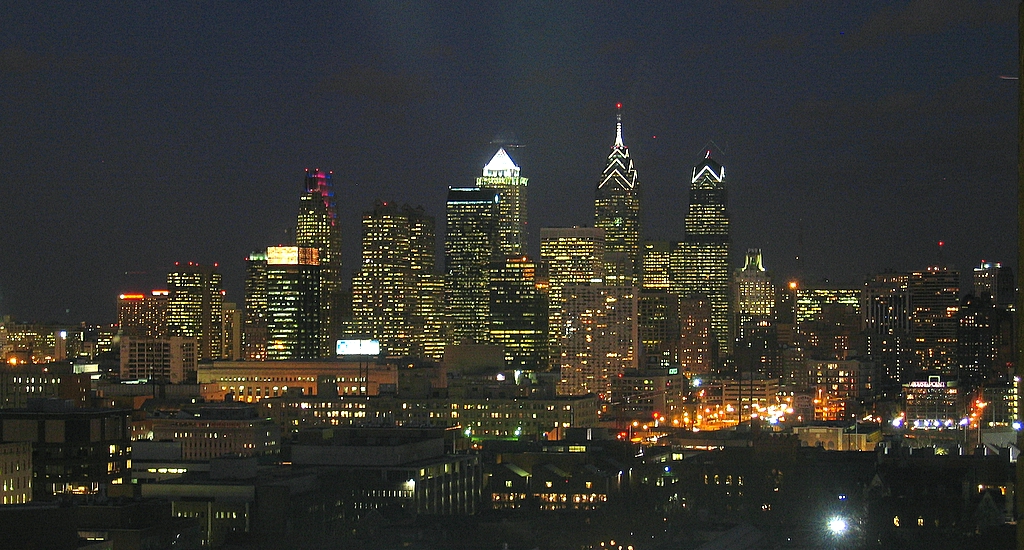|
|
| Philadelphia |

The City of Brotherly Love
Philadelphia (/ˌfɪləˈdɛlfiə/) is the largest city in the Commonwealth of Pennsylvania and its only consolidated city-county, the fifth-most-populous city in the United States, and the core of the sixth-largest metropolitan area in the country. Located in the Northeastern United States at the confluence of the Delaware and Schuylkill rivers, Philadelphia is the economic and cultural center of the Delaware Valley. The population of the city was counted at 1,526,006 in 2010[ and estimated at 1,560,297 in 2014, according to the United States Census Bureau. The four Pennsylvania counties nearest Philadelphia had an estimated total population of 2,510,793 in 2013; while by 2014 census estimates, the Philadelphia metropolitan area, also known as the Delaware Valley, is home to 6.1 million residents, and the larger Philadelphia-Reading-Camden, PA-NJ-DE-MD Combined Statistical Area contains approximately 7.2 million residents.
In 1682, William Penn founded the city to serve as capital of the Pennsylvania Colony. During the American Revolution, Philadelphia played an instrumental role as a meeting place for the Founding Fathers of the United States, who signed the Declaration of Independence in 1776 and the Constitution in 1787. Philadelphia was one of the nation's capitals during the Revolutionary War, and the city served as the temporary U.S. capital while Washington, D.C., was under construction. During the 19th century, Philadelphia became a major industrial center and railroad hub that grew from an influx of European immigrants. It became a prime destination for African Americans during the Great Migration and surpassed two million occupants by 1950. Following numerous civil rights protests and riots, the city experienced decades of heavy crime and neared bankruptcy by the 1980s. Revitalization began in the 1990s, with gentrification turning around many neighborhoods and reversing its decades-long trend of population loss.
Philadelphia is the center of economic activity in Pennsylvania and is home to seven Fortune 1000 companies. The Philadelphia skyline is growing, with several nationally prominent skyscrapers. The city is known for its arts, culture, and history, attracting over 39 million domestic tourists in 2013 Philadelphia has more outdoor sculptures and murals than any other American city, and Fairmount Park is the largest landscaped urban park in the world. The 67 National Historic Landmarks in the city helped account for the $10 billion generated by tourism Philadelphia is the birthplace of the United States Marine Corps, and is also the home of many U.S. firsts, including the first library (1731), first hospital (1751) and medical school (1765), first Capitol (1777),first stock exchange (1790), first zoo (1874), and first business school (1881).
For a more detailed treatment of the great and beloved City of Piladelphia please see http://www.UShistory.org
In 1681, King Charles II gave Penn a large piece of his newly acquired American land holdings to repay a debt the king owed to Admiral Sir William Penn, Penn's father. This land included present-day Pennsylvania and Delaware, though the claim as written would create a bloody conflict with Maryland (dubbed Cresap's War) over the land grant already owned by Lord Baltimore. Penn put together a colonial expedition and fleet, which set out for America in the middle of the following summer. Penn, sailing in the vanguard, first set foot on American soil at the colony at New Castle, Delaware.[2] An orderly change of government ensued, as was normal in an age used to the privileges and prerogatives of aristocracy and which antedated nationalism: the colonists pledged allegiance to Penn as their new Proprietor. The first general assembly was soon held in the colony.
Afterwards, Penn journeyed up the river and founded Philadelphia with a core group of accompanying Quakers and others seeking religious freedom on lands he purchased from the local chieftains of the Lenape or Delaware nation.[3] This began a long period of peaceful co-operation between the colony and the Delaware, in contrast to the frictions between the tribe and the Swedish and Dutch colonists.[4] However, the new colonists would not enjoy such easy relations with the rival and territorial Conestoga peoples to the west for a number of decades[3] as the English and Dutch German settlers attracted to the religiously tolerant colony worked their way northwest up the Schuylkill and due west south of the hill country into the breadbasket lands along the lower Susquehanna River.[4] Lord Baltimore and the Province of Maryland had circa 1652-53[4] finished waging a decade long declared war against the Susquehannocks and the Dutch,[4] who'd been trading them furs for tools and firearms for some time.[4] Both groups had uneasy relations with the Delaware (Lenape) and the Iroquois.[4] Furthermore, Penn's Quaker government was not viewed favorably by the Dutch, Swedish, and English settlers in what is now Delaware. They had no "historical" allegiance to Pennsylvania, so they almost immediately began petitioning for their own Assembly. In 1704, they achieved their goal when the three southernmost counties of Pennsylvania were permitted to split off and become the new semi-autonomous colony of Lower Delaware. New Castle, the most prominent, prosperous and influential settlement in the new colony, became the capital. During its brief period of ascendancy as an empire following the victory by Gustav the Great battle of Leipzig Swedish settlers arrived in the area in the early 17th century to found a nearby colony, New Sweden in what is today southern New Jersey. With the arrival of more numerous English colonists and development of the port on the Delaware, Philadelphia quickly grew into an important colonial city.
|
|
|
|
|